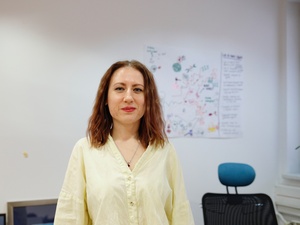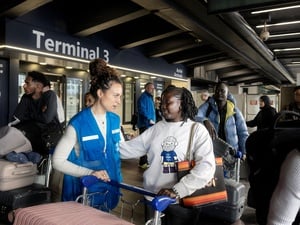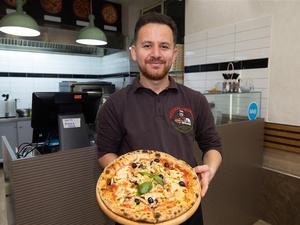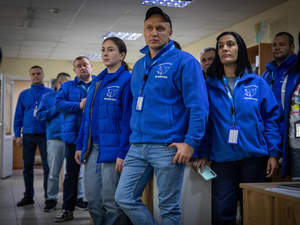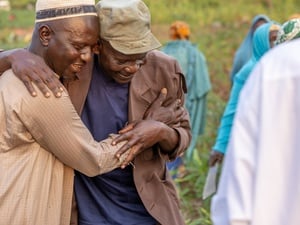Three years on, employment opportunities in Poland means hope for refugees from Ukraine
Three years on, employment opportunities in Poland means hope for refugees from Ukraine

Irena supports an elderly woman in a nursing home in Gdansk. With 25 years of experience as a nurse in Ukraine, she hopes to share her skills and contribute to her new community in Poland.
"Who would want to leave their home? Nobody. Today everything is destroyed there, I have nothing to go back to". In a large nursing home in Gdańsk, run by Caritas, one of the largest charity organizations in Poland, Irena reflects on leaving Ukraine. "Kherson immediately became a target of attacks. There was no other choice, we had to run. It was terrible. Who would want to leave their job and home?"
Today, Irena has safety and stability. Since November 2023 she has been working in a nursing home, caring for older people in Gdańsk. She warmly greets every patient she visits in the wards. She takes great pride in her work, bringing a heartfelt commitment to her rounds and interactions. Irena knows how important such an approach is, because in Kherson in eastern Ukraine she worked for 25 years as a nurse in a ward for children with cancer.
Irena felt determined to contribute to her new community, and on passing the nursing home one day she was compelled to enter and asked if she could be of any use. She was accepted immediately. "I have 12-hour shifts. It's hard and demanding work. It requires passion, something I will always have."
Since the full-scare war broke out on 24 February 2022, Poland has been generously hosting some 1 million refugees from Ukraine, who fled the country to seek safety and security. Not only were they greeted with open arms and hearts, but refugees were also given full access to services, including mental health support, education, the labour market, accommodation and various social benefits.
To boost inclusion of refugees in the labour market, UNHCR, the UN Refugee Agency, is supporting organizations who will help refugees find jobs. This is done by small grants awarded to non-governmental organizations (NGOs) that work with vulnerable refugees or entrepreneurs whom they help set up their businesses. UNHCR also works in partnership with organizations like Caritas, to help refugees find jobs by referring them to potential employers, training them to prepare for job interviews, teaching Polish, helping with CVs and organizing reskilling programmes.
There have already been positive impacts of refugee inclusion. According to a 2023 UNHCR/Deloitte report, thanks to the temporary protection of Ukrainian refugees which means they had full access to jobs from the start of the crisis, Ukrainian refugees have already contributed to some 1 percent of Poland’s GDP by paying taxes and contributing to the economy.
Situated on the Polish Baltic Sea, some 30 minutes north of Gdańsk is Sopot, a popular beach resort in Poland. The Caritas aid center in Sopot has a long history of welcoming people who need material help or food. The old building is hard to miss, positioned close to the train station, the characteristic logo shines like a beacon of hope for the poorest people in the area. Every morning, before the doors open, a group of people stand waiting expectantly. Inside, several employees of Caritas are bustling, arranging packages with food aid and clothes.
Among them is Viktoria, who is packing boxes of humanitarian aid into her van, to be delivered to those in need.

Viktoria proudly sits behind the wheel of her van in Gdansk, Poland. Working for the charity organization Caritas, Viktoria wants to help poorer communities in the city she temporarily calls home.
Viktoria has been working at Caritas for a year and a half. Officially as a driver, but the scope of her duties has become much broader. She inventories humanitarian aid, delivers it to other aid centers and now manages the main warehouse, where all of the materials are being stored.
"In Ukraine, I had my own thriving company. I delivered high-quality meat to the best restaurants in the country," says Viktoria. "But the pandemic and the war came, and the business collapsed."
Viktoria arrived in Poland from Dnipro in August 2022, with her sons Artem and Maksym, who are now 10 and 16 years old. She started helping people in need in her new community almost immediately. That's how – purely by accident - she found employment at Caritas. She was gathering hygiene items from local stores and donating them to Caritas, in an effort to help some of the poorest people in Sopot, both Ukrainian refugees and locals. After sharing her skills and background in Ukraine, where she was also a forklift driver, she was quickly recruited as a driver for Caritas. Viktoria now uses her van to deliver items directly to people in need across the city.

Natalia arrived in Poland in March 2022 from the city of Kropyvnytskyi in central Ukraine. She is now Head of the Caritas Volunteer Center of the Archdiocese of Gdansk.
In the port city of Gdańsk, Natalia is managing a network volunteers, in her position as Head of the Caritas Volunteer Center of the Archdiocese of Gdańsk. Despite her young age of 28 years old, Natalia takes her work seriously, coordinating parish Caritas branches, that provide assistance to the poorest and hardest-to-reach people in the city, benefitting both Polish and refugee communities.
Arriving to Poland in March 2022, Natalia left the city of Kropyvnytskyi in central Ukraine, along with her parents, sister and her young child. As she says, her family, which supported itself through farming, went bankrupt almost overnight.
"In Poland, I received incredible support from Polish aid organizations, so I decided to repay this debt of gratitude," she says. "I didn't want to sit idly by." She became a volunteer - first with the European Solidarity Corps, and then with the Volunteer Center, which she now manages. "I work very hard. I created health support projects, among others for the elderly, and now I also run volunteering classes in schools, because teaching engagement and mindfulness should start in primary school," says Natalia.
According to figures by UNHCR, more than 4,000 refugees assessed their skills and qualifications with a counsellor and received upskilling support, while over 600 enrolled in specialized training courses in Poland. Almost 1,000 refugees found quality employment – with about 3 out of 4 securing it for more than three months.
For Viktoria and Irena, their level of commitment continues. Viktoria recently returned from Opole in southwest Poland, where – along with many other refugees from Ukraine - she provided hand-on support in September 2024, distributing humanitarian aid to people affected by the catastrophic floods. And Irena is completing her nursing studies, so that her Ukrainian qualifications will also be recognized in Poland.



